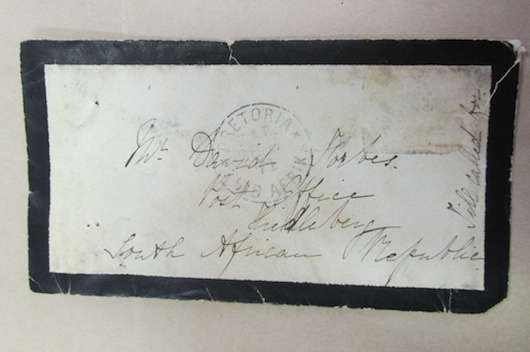The medium and the message, thoughts on an envelope

This envelope, together with the letter it contained, arrived with David Forbes, its addressee, at either the post office in ‘Hidelberg’ [the present Heidelberg], or was sent on to him after he left there. In fact it had contained two letters, one from his wife Kate Forbes and the other from her younger sister Sarah Purcocks. Its date stamp, barely legible, is ‘SE 8 71’, that is, 8 September 1871. The medium of the envelope and the message of the letters have an interesting relationship.
David Forbes was a Transvaal farmer and entrepreneur, originally from Scotland. From early April to later November 1871, he was away from his farm at Athole in the eastern Transvaal. Diamonds had been discovered in a number of places and particular the then-called ‘new rush’, later Kimberley, area. Many thousands of people travelled there, including from New Zealand, Cornwall, the USA, as well as many places in southern Africa, hoping to make their fortunes with quick findings. Forbes – working with some other family members, friends and neighbours together with men employed as drivers and labourers – was among them. His trip had to be arranged with others because a working group couldn’t be organised after arrival because labour was in such short supply there; and it couldn’t be postponed because the rush was happening and claims were being grabbed and worked and would soon all be claimed and the opportunity provided end.
When Forbes left, it was with the knowledge that his wife Kate was around three months pregnant. His letters among other things express knowledge of the dilemma, that for their future he had to seize this opportunity, but that he was desperately worried – his word is anxious – about Kate and whether she would be alright, and he felt terrible about being away from her whenever he wasn’t totally immersed in digging and sifting and sorting. As his letters and those to him unfold, he anticipates rich findings to fund new economic ventures, hears about the death of Kate’s uncle by marriage Alexander McCorkindale, has trouble with some of his companions, leaves one digging area for another and then another, worries about Kate, scrambles for new and more productive claims, writes about all his activities, and responds to what he hears from home. A crescendo of comments in his letters also appear, concerning his anxieties regarding Kate and the coming childbirth.
The envelope shown above would have arrived around two to three weeks after the birth, news of which was conveyed to Forbes in the letter it contained written by Sarah Purcocks. This is dated 20 August 1871 and was most likely received by David soon after 8 September. But imagine the situation. This is a man being pulled into different directions, mining and materialities, home and loving companionship, in the context of the seemingly fragile health of the pregnant Kate, who was subject to epileptic fits, in the wider context of many women dying in childbirth. What arrived with him was an envelope with its deep black edges signalling a close death and mourning. As he collected his letter from the post office and saw the envelope, what went through his mind? Did he struggle to open it to find out the worst? Did he forget about McCorkindale’s death? When he saw that the short letter from Kate it contained was written before she went into labour, did he suppose that Sarah’s longer letter would tell him of Kate’s death and/or that of the baby? And what were his feelings, surely also very mixed, when he learned that Kate had nearly died, had suffered a fit that nearly killed her, had experienced a terrible labour, but had survived along with a large healthy child, another boy to add to their existing three sons and two daughters?
Sarah Purcocks and others back in the eastern Transvaal were living out the daily knowledge of Alexander McCorkindale’s death and its social as well as financial and other ramifications, for his wife was their maternal aunt and the guiding presence in the wider family. The envelope would have most likely meant little to Sarah other than one of the many small everyday observances regarding McCorkindale’s death. Although David knew McCorkindale had died, having been told of it by another miner before a letter from home conveyed the news, it was very much background to the range of his activities, concerns and worries. For Sarah, the envelope meant little more than the routine niceties of mourning; while for David, the envelope potentially held something that would be a kind of Pandora’s box, the destruction of his world of affect.
It’s just an envelope; but…
Last updated: 11 May 2018





